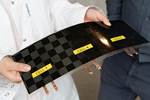Sinonus launches energy-storing carbon fiber
Swedish deep-tech startup Sinonus is launching an energy-storing composite material to produce efficient structural batteries, IoT devices, drones, computers, larger vehicles and airplanes.
Sinonus (Borås), a Swedish startup, has announced the development of carbon fibers that can double as battery electrodes. Recently appointed CEO Markus Zetterström is focusing on commercializing this effort. Sinonus is already replacing AAA batteries in low-power products in its lab, with the goal of expanding the technology to larger applications such as IoT devices, drones, computers, larger vehicles and airplanes.
Carbon fiber has the ability to store energy electrochemically. Sinonus aims to use this multifunctionality to make carbon fiber-based structural batteries that can not only store energy but also become an integral part of the product's structure.
Sinonous’ carbon fiber technology originates from Oxeon, another Chalmers Venture’s portfolio company. The carbon fiber was used in the propeller blades for NASA’s Ingenuity helicopter on Mars. According to the company, these were chosen by the engineering team due to their ultralight weight and thinness.
For passenger aircrafts to be powered by electricity, they need to be much lighter than they are today. Moreover, weight reduction is also important for road vehicles, enabling a driving range extension per battery charge; most electric vehicles can weigh almost 50% more than regular cars because of their use of lithium-ion batteries. A true structural battery, however, can function as both a power source and as part of the structure, for example, in a car body.
“Storing electrical energy in carbon fiber may perhaps not become as efficient as traditional batteries, but since our carbon fiber solution also has a structural load-bearing capability, very large gains can be made at a system level,” says Zetterström.

The development of structural batteries at Chalmers University of Technology has proceeded through many years of research, including previous discoveries involving certain types of carbon fiber. According to a study from the same university, the introduction of carbon fiber-based structural batteries could increase the driving range for lightweight EVs by 70%. In addition, the lower energy density of structural batteries are said to make them safer than standard batteries, especially as they would also not contain any volatile substances.
”With his prior experience at Maurten and from leading strategy and transformation at SKF Group, Markus Zetterström is a valuable asset to Sinonus. His expertise will be instrumental in bringing their product from development to successful market launch. Chalmers Ventures are venture builders, meaning that in addition to funding, helping Sinonus find the perfect CEO matched our strategy perfectly,” says Pontus Ottosson, CEO at Chalmers Ventures.
Related Content
-
McLaren celebrates 10 years of the McLaren P1 hybrid hypercar
Lightweight carbon fiber construction, Formula 1-inspired aerodynamics and high-performance hybrid powertrain technologies hallmark this hybrid vehicle, serve as a springboard for new race cars.
-
SMC composites progress BinC solar electric vehicles
In an interview with one of Aptera’s co-founders, CW sheds light on the inspiration behind the crowd-funded solar electric vehicle, its body in carbon (BinC) and how composite materials are playing a role in its design.
-
Jeep all-composite roof receivers achieve steel performance at low mass
Ultrashort carbon fiber/PPA replaces steel on rooftop brackets to hold Jeep soft tops, hardtops.















